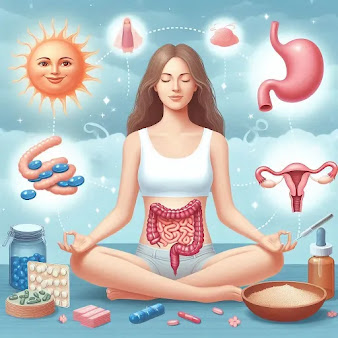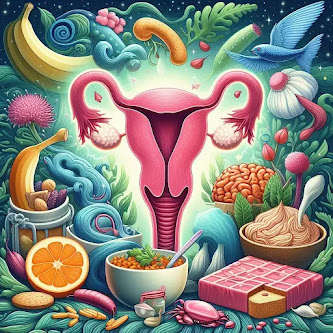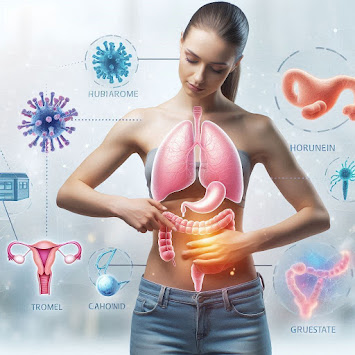Leaky Gut, Cravings, and PMS: The Divine Connection Between Intestinal Health and Hormonal Balance
Author: Catherine M
Date Published: 4/5/25
"I praise you because I am fearfully and wonderfully made; your works are wonderful, I know that full well." – Psalm 139:14
Have you ever noticed how, right before your period, your cravings hit hard, your emotions swing wildly, and you just don’t feel like yourself? It’s not just “PMS” — it could be your gut sending distress signals.
As women, our hormonal shifts are normal, but when symptoms feel overwhelming, there may be deeper imbalances. One overlooked root cause is a Leaky gut. This condition can disrupt your hormonal rhythm, trigger inflammation, and make your monthly cycle feel like a battlefield.
For many women, premenstrual syndrome (PMS) has long been considered simply "part of being a woman"—something to endure rather than address at its root. But what if these monthly challenges are actually messages from our bodies, alerting us to imbalances that can be corrected?
But here’s the good news: God designed your body to heal. When you nourish your gut, you restore balance to your hormones, your mood, and your energy. Let’s unpack how your gut and hormones are beautifully connected—and how to bring healing and harmony back into alignment with God’s design.
Recent scientific discoveries have revealed an extraordinary connection between gut health and hormonal balance, particularly regarding PMS symptoms. This article explores this divine connection and offers faithful approaches to honoring the body's design through proper gut care.
The Science of Leaky Gut and PMS
Understanding Intestinal Permeability
Your small intestine is lined with a protective barrier that controls what enters your bloodstream. Think of it like a finely woven net—small enough to absorb nutrients but strong enough to keep out toxins and bacteria.
When that lining becomes damaged—due to things like stress, processed foods, medications, or chronic inflammation—it becomes “leaky.” Undigested food particles, toxins, and bacteria escape into your bloodstream, triggering inflammation and confusing your immune system.
This is what scientists refer to as increased intestinal permeability, or leaky gut (Fasano, 2012). Over time, this silent issue can disrupt nearly every system in your body—especially your hormones. While conventional medicine once dismissed this term, research now confirms that intestinal permeability is real and has profound effects throughout the body.
Fascinating changes occur in the gut during the luteal phase of a woman's cycle (the time between ovulation and menstruation). Research published in the journal "Characteristics of the gut microbiota in women with premenstrual symptoms: A cross-sectional study" (PMC9140228) revealed that women experience spikes in a protein called zonulin during this phase. Zonulin is known as the "gatekeeper" of intestinal permeability—when it increases, the tight junctions between intestinal cells loosen, creating a more permeable gut barrier.
The Bacterial Connection
This increased permeability allows bacterial endotoxins (particularly lipopolysaccharides, or LPS) to enter the bloodstream. These endotoxins trigger inflammation and directly impact the brain's dopamine system. This disruption helps explain why many women experience intense cravings for sugar and carbohydrates before their periods—it's not just hormonal, as previously believed, but connected to gut-derived inflammation affecting brain chemistry.
The discovery challenges the conventional wisdom that PMS cravings are "just hormonal." Instead, it points to a deeper connection between gut health and hormonal symptoms—a connection that, when understood properly, offers new approaches to finding relief.
Your gut and hormones talk to each other constantly. If your gut is inflamed, your hormones can’t function properly. Here’s how it works:
1. Estrogen Recycling Gone Wrong
Your gut helps break down and eliminate excess estrogen through the estrobolome—a collection of bacteria that regulate estrogen levels. If your gut is leaky or imbalanced, excess estrogen may be reabsorbed rather than excreted. This can lead to estrogen dominance, which is linked to PMS, bloating, irritability, breast tenderness, and heavy periods (Vodička & Mrázová, 2022).
2. Cravings from Blood Sugar Swings
When your gut is inflamed, it impacts your insulin sensitivity and causes blood sugar to rise and fall unpredictably. This triggers intense cravings, especially for sugar and carbs, before your period. This is your body trying to soothe stress and inflammation—but it becomes a vicious cycle.
3. Mood Imbalance and Anxiety
More than 90% of serotonin (your “feel-good” neurotransmitter) is produced in the gut. When your microbiome is out of balance, serotonin levels drop, leaving you feeling anxious, depressed, and emotionally fragile during your luteal phase (Clarke et al., 2014).
4. Low Progesterone and Heightened PMS
Chronic inflammation from a leaky gut raises cortisol (your stress hormone), which can suppress the production of progesterone. This hormone is responsible for calming your brain, regulating sleep, and balancing estrogen. Without enough progesterone, PMS symptoms worsen.
“Dear friend, I pray that you may enjoy good health and that all may go well with you, even as your soul is getting along well.” – 3 John 1:2
Our bodies are temples—sacred, resilient, and capable of restoration. Healing leaky gut is not about perfection. It’s about honoring God’s creation and aligning your lifestyle with His blueprint for wholeness.
God's Design: Specific Bacterial Strains as Guardians of Hormonal Balance
Our Creator has filled our intestines with trillions of bacteria that serve as guardians of our health. Among these microscopic helpers are specific strains that play crucial roles in hormonal balance and mood regulation.
Butyricicoccus: The Mood Stabilizer
Butyricicoccus is a beneficial bacterial genus that produces butyrate, a short-chain fatty acid with powerful anti-inflammatory properties. Research from "Impact of nutritional diet therapy on premenstrual syndrome" (PMC9928757) shows that women with PMS often have depleted levels of Butyricicoccus, resulting in reduced butyrate production.
Why does this matter? Butyrate helps maintain the integrity of the intestinal barrier, preventing leaky gut. It also influences the production of neurotransmitters like serotonin, often called the "happy chemical," which regulates mood, sleep, and appetite. When Butyricicoccus levels are low, women may experience more severe mood swings, anxiety, and cravings during the premenstrual phase.
To nourish this beneficial bacteria, consider incorporating these foods into your diet:
- Jerusalem artichokes
- Oats and Barley
- Apples (with skin)
- Flaxseeds
- Garlic and onions
- Sweet potatoes
- Cooked cruciferous vegetables
- Wild-caught fish
By intentionally consuming foods that support Butyricicoccus, you're honoring God's design for gut-hormone balance.
Parabacteroides: The Inflammation Fighter
Another crucial bacterial strain is Parabacteroides, which plays a vital role in preventing inflammation and supporting serotonin production. A groundbreaking 2024 study revealed that women with Premenstrual Dysphoric Disorder (PMDD)—a severe form of PMS—have 63% less Parabacteroides than women without the condition.
This significant reduction helps explain why some women experience debilitating mood symptoms before their periods. Parabacteroides helps regulate the immune system and reduces inflammatory markers that can trigger anxiety, depression, and irritability.
To support healthy levels of Parabacteroides, include:
- Fermented foods like kimchi and sauerkraut
- Dark leafy greens
- Blueberries and other polyphenol-rich foods
- Omega-3 fatty acids from fish or flaxseed
Megasphaera: The GABA Producer
The bacterial strain Megasphaera deserves special attention for its remarkable ability to convert fiber into butyrate. According to research (PMC9140228), this bacterial strain can increase GABA production by 2.1 times. GABA (gamma-aminobutyric acid) is an inhibitory neurotransmitter that helps calm the nervous system and reduce anxiety.
Women with optimal levels of Megasphaera report significantly lower anxiety levels during the premenstrual phase. This bacterial strain thrives when you consume:
- Resistant starches (cooked then cooled potatoes, rice, and pasts)
- Green bananas
- Legumes and beans
- Whole grains
By intentionally cultivating these beneficial bacteria through nutrition, we collaborate with God's design for hormonal balance.
Movement as Medicine: Exercise's Impact on Gut Health and PMS
Physical activity is another divine gift for maintaining gut-hormone harmony. Scripture reminds us that caring for our bodies honors the Creator: "Therefore glorify God in your body" (1 Corinthians 6:20). Exercise affects gut bacterial composition in remarkable ways that directly impact PMS symptoms.
Exercise and Microbial Diversity
Research shows that regular physical activity increases the diversity of gut bacteria—a key marker of gut health. Higher diversity means greater resilience against inflammation and better hormone metabolism. Different exercise types affect the gut microbiome in various ways:
- Aerobic exercise (walking, jogging, swimming) increases beneficial bacteria like Akkermansia, which strengthens the gut lining.
- Strength training reduces inflammatory bacteria while increasing short-chain fatty acid producers.
- Yoga and stretching reduce stress hormones that can disrupt gut barrier function.
Strategic Exercise Throughout Your Cycle
To maximize the gut-hormone benefits of exercise, consider aligning your workouts with your menstrual cycle:
- Follicular phase (days 1-14): Energy is typically higher during this time. Focus on more intense activities like interval training, running, or strength workouts.
- Luteal phase (days 15-28): As PMS symptoms may emerge, gentle movement, such as walking, swimming, or yoga, can reduce inflammation and support gut health without adding stress to the body.
Exercise also offers opportunities for prayer and meditation, creating a holistic approach to caring for the body as a temple. Consider using movement time to express gratitude for your body's design and to pray for healing where needed.
Putting It All Together: A 14-Day Protocol to Heal Leaky Gut and Reduce PMS Cravings
Based on the research and understanding of God's design for the gut-hormone connection, here's a two-week approach to begin healing:
Week 1: Remove and Restore
Days 1-3: Remove Common Gut Irritants
- Eliminate processed foods, refined sugars, dairy, gluten, and artificial ingredients
- Reduce alcohol, caffeine, and inflammatory oils
- Begin a prayer journal focused on body stewardship
Days 4-7: Introduce Healing Foods
- Bone broth for gut lining repair
- L-glutamine: an amino acid that fuels gut cells
- Zinc, which supports immune health and barrier function
- Cooked vegetables for gentle fiber
- Small amounts of fermented foods
- Healthy fats like avocado and olive oil
- Scripture meditation on healing (Psalm 103:1-5)
Week 2: Reinoculate and Repair
Days 8-10: Support Specific Bacterial Strains
- Add resistant starch foods to support Megasphaera
- Include polyphenol-rich berries for Parabacteroides
- Incorporate prebiotic fiber: garlic, onions, leeks, asparagus, and bananas for Butyricicoccus
- Continue limiting inflammatory foods
- Prayer focus on patience in the healing process
- Consider a high-quality probiotic if you’ve taken antibiotics recently.
Days 11-14: Strategic Movement and Mindfulness
- Begin gentle daily movement appropriate for your cycle phase
- Eat balanced meals at regular times (especially a protein-rich breakfast to stabilize cortisol and blood sugar)
- Prioritize 7–9 hours of sleep
- Practice stress reduction through prayer, deep breathing, or meditation
- Continue gut-supportive nutrition
- Express gratitude for your body's healing capacity
- Scripture meditation on being "fearfully and wonderfully made" (Psalm 139:14)
A Success Story of Divine Design
Sarah, a 34-year-old mother of two, struggled with intense PMS cravings and mood swings for years. "I would become someone I didn't recognize for about 10 days each month," she recalls. "The sugar cravings were so intense that I couldn't resist them, and then I'd feel worse from the inflammation."
After learning about the gut-hormone connection, Sarah committed to a gut-healing protocol similar to the one outlined above. "I approached it as an act of stewardship, caring for my body as God intended," she explains. "Within three months, I noticed my cravings had diminished significantly. By six months, my mood was stable throughout my cycle, and I felt connected to myself in a way I hadn't before."
Sarah's story reflects what research is confirming: when we honor our body's divine design by caring for our gut health, hormonal balance often follows.
Conclusion
The connection between gut health and PMS reveals the intricate wisdom of our Creator's design. As science uncovers these connections, we gain a deeper appreciation for the psalmist's words: "I praise you because I am fearfully and wonderfully made; your works are wonderful, I know that full well" (Psalm 139:14).
Rather than viewing PMS as a curse to endure, we can see it as an opportunity to listen to our bodies' signals and respond with faithful stewardship. By nurturing the beneficial bacteria that support hormonal balance, removing inflammatory triggers, and moving our bodies in ways that support gut health, we honor the divine design of our bodies.
You are not broken—you are beautifully made. Symptoms are your body’s way of whispering for help. When we pause and listen, we can respond with compassion and wisdom. Healing your gut isn’t about chasing perfection—it’s about returning to God’s design of peace, wholeness, and balance.
So the next time cravings strike or PMS hits hard, ask yourself: How can I nourish my gut today?
Because when your gut is whole, your hormones fall into place. And when your body is at peace, your soul can rest, too.
As you implement these strategies, remember that healing is a process that unfolds over time. Have patience with your body and trust in the wisdom of its design. Through proper care of our "inner garden" of gut bacteria, many women find relief from the monthly struggles of PMS and experience greater hormonal harmony—a testament to the Creator's intentional and thoughtful design.
References
-
-
Fasano, A. (2012). Leaky gut and autoimmune diseases. Clinical Reviews in Allergy & Immunology, 42(1), 71–78. https://doi.org/10.1007/s12016-011-8291-x
-
Vodička, M., & Mrázová, M. (2022). Gut microbiota and estrogen metabolism: How gut bacteria influence hormonal balance. Frontiers in Endocrinology. https://doi.org/10.3389/fendo.2022.941311
-
Clarke, G., Grenham, S., Scully, P., Fitzgerald, P., Moloney, R. D., Shanahan, F., ... & Cryan, J. F. (2013). The microbiome–gut–brain axis during early life regulates the hippocampal serotonergic system in a sex-dependent manner. Molecular Psychiatry, 18(6), 666–673.
-
Jakubowicz, D., et al. (2013). High caloric intake at breakfast vs. dinner differentially influences weight loss of overweight and obese women. Obesity. https://doi.org/10.1002/oby.20460
⚠️ Disclaimer
This article is for informational and educational purposes only. It is not intended to diagnose, treat, cure, or prevent any disease. Always consult your doctor or a qualified health professional before making any changes to your diet, supplements, or lifestyle—especially if you are pregnant, nursing, taking medications, or managing a health condition.
-





Comments
Post a Comment